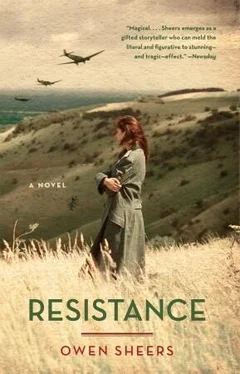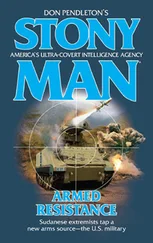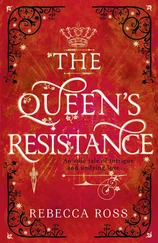One by one, with the slightest of nods, each man agreed to what Albrecht had proposed. There was just one condition, voiced by Gernot.
“What about our letters, sir?” Their letters. The letters they had written over the long nights of the winter. Of course they would want them posted, so their families and loved ones might know they were safe, that they had survived the invasion and would be coming home soon.
Albrecht nodded, smiling at Gernot. “Don’t worry about them,” he said. “I’ll send them myself.”
And that was why, two mornings later, when the snow had reduced to uneven patches on the valley’s slopes and ragged strips skirting the fields, Albrecht kick-started the motorbike and rode down the lane towards the railway station at Pandy. It made sense for him to be the one to take the letters. As an officer he was less likely to be stopped or questioned, he was the only fluent English speaker, and because the patrol’s silence was his initiative, it somehow seemed apt that as a concession to this, he be the bearer of their voices to the outside world.
Albrecht was willing to accept the responsibility, but only because he had no intention of delivering the letters. To him, it was madness. What was more important? These men’s families being informed of their safety or that safety being ensured by their silence? He still went through the routine of censoring the letters, omitting any mention of their position or whereabouts, but purely for the sake of the younger soldiers, for whom, he realised, it was vital they believe their words were going home even if they weren’t.
At first he’d intended to ride the motorbike just far enough for its engine to no longer be heard at The Court, until he was out of sight and sound of the patrol. But the sensation of its speed, of movement after so many days of stillness, caught him unawares. It was another bright day, sudden on the senses. His taste and smell, although still blunted, were both improving, and he could just make out the steeliness of the air as it rushed past him. Snowdrops were budding in the banks of the hedgerows and the steep sides of the valley were baring their nerves, the brooks and streams swollen white with the thawing snow and ice. All of it got the better of Albrecht and he rode further than he’d planned, beyond the mouth of the valley and on down the narrow lane towards Llanvoy.
Albrecht had already stopped the bike and was about to dismount when he saw a young man cycling up the lane towards him. A brief wave of panic overtook him. This was the first person outside the patrol and the farm women he’d seen in over three months. There was no one else around, not even a house or farm in sight. A story from his days in Holland at the start of the war came back to him, about a cyclist in the Dutch resistance whose quickness of drawing and firing his pistol from the saddle was so feared that soldiers took cover and cocked their rifles whenever a lone man on a bicycle approached. But then Albrecht remembered where he was, who he was meant to be. He resisted the urge to twist the throttle and ride away and stayed put, the motorbike’s engine thrumming under him as the young man leant over his handlebars to tackle the gradient of the slope.
“Stop, please.” The order felt strange, unfamiliar on Albrecht’s tongue.
The man was almost level with him and clearly hadn’t been intending to even pause as he passed him. Now he pulled up, panting from the effort of the hill behind.
“Your papers?”
The young man took off a glove and pulled a booklet from the inside pocket of his jacket. He was in his early twenties, if that. A sullen look to him, blond hair, clean-shaven, small and thin.
“Where are you going?” Albrecht asked, inspecting the pages of the booklet.
“Up the Olchon,” the man replied. “Got some letters t’deliver.”
“You are a postman?” Albrecht said, looking at his jacket, the dirt under his nails, his rough corduroy trousers, and worker’s boots.
“No.” He looked at Albrecht for the first time. “Post office has a backlog from the winter. Said I’d help out.”
“Let me see them,” Albrecht said, passing back the booklet and holding out his hand.
The man drew out a thin bundle of letters from another pocket and gave them to Albrecht. Albrecht untied the string and leafed through the envelopes, reading the addresses. Hywel and Mary Griffiths. William and Margaret Jones. Tom and Sarah Lewis .
Taking a pen from his own pocket he wrote across the front of each envelope, as clearly as he could. Deceased. Return to Sender . He handed them back to the young man, who read what Albrecht had written then looked back up at him, his sullen expression slipping.
“There is no one left in that valley,” Albrecht said simply. “Tell the postmaster he needn’t send any more letters there.”
The man looked at Albrecht, straight in the face, a muscle twitching at his jaw. For a second it seemed as if he might speak, but he didn’t. Slipping the letters back into his jacket, he put on his glove and slowly, still looking at Albrecht, turned his bicycle to freewheel back down the lane. Albrecht watched as the young man’s back shrunk down the hill and around the corner of the lane. His heart was beating hard. It was the right thing to have done. By killing the women he had saved them. By inscribing death across their names he had given them life. This is what he told himself as he dismounted the motorbike, crouched by the side of the lane, and put a match to the corner of his own men’s letters, turning the bundle slowly in the air until he felt the heat of the flames against his hand. He dropped the sheaves of paper, still burning, into the long grass. A light wind rose up the lane. Albrecht stood and watched as it lifted the ashes of his men’s words, printing them across the unthawed patches of snow.
George cycled back down the lanes, his mind spinning as fast as the wheels of his bicycle. Deceased. Return to Sender . It was true then. What old Bob Kelly had told him was true. The railway man had been working up the line when he’d seen a body carried through. The dead man wore dull khaki dungarees over a thick woollen jumper. An insurgent, he’d been told by one of the guards, caught the night before laying charges on the line. Although Bob hadn’t seen the man’s face, he’d sworn it was William Jones of the Olchon. This was why George had offered to help out with the backlog post when the thaw set in. Although he’d never knowingly met William Jones, he’d told the postmaster he had to visit him, so he could take the letters for the Olchon, seeing as he was going there anyway. But he hadn’t even had to enter the valley to discover that what Bob had said was true. The German officer had made that clear enough. William’s family, and all the other families in the Olchon it seemed, had paid the price for his, and probably others’, involvement with the Auxiliary Units.
George couldn’t remember recording any recent troop movements in this direction and the lanes had been impassable for months. The soldiers must have come into the valley over the Black Hill instead, a pack of them descending on horseback, just as they had elsewhere throughout the winter.
What was most shocking to George was not what the German officer had written across those letters, but his own lack of surprise. He’d heard enough similar stories over the last three months to half expect this, to cycle into a deserted valley. The Germans had been true to their word. Ten civilians executed for every German soldier killed. That was what it said on the posters signed by Field Marschal Walther von Brauchitsch, the newly appointed Reichsprotektor of Occupied Britain. The “insurgency,” as the Germans called it, hadn’t faltered in the face of this threat and had left a trail of massacred villages in its wake. Von Brauchitsch had ordered the confiscation of all private wirelesses, so it was hard for George to tell for certain, but from the muted reports in the Star and other Nazibacked newspapers, he thought the insurgency was still causing the Germans trouble. Although most of the Americans had been shipped back to defend their homeland against the Japanese he knew that many British regular fighting units had melted into the civilian population and were also taking part in guerrilla activities. Ever since the BBC had moved to Worcestershire, the railway up to Hereford had sustained regular attacks.
Читать дальше












